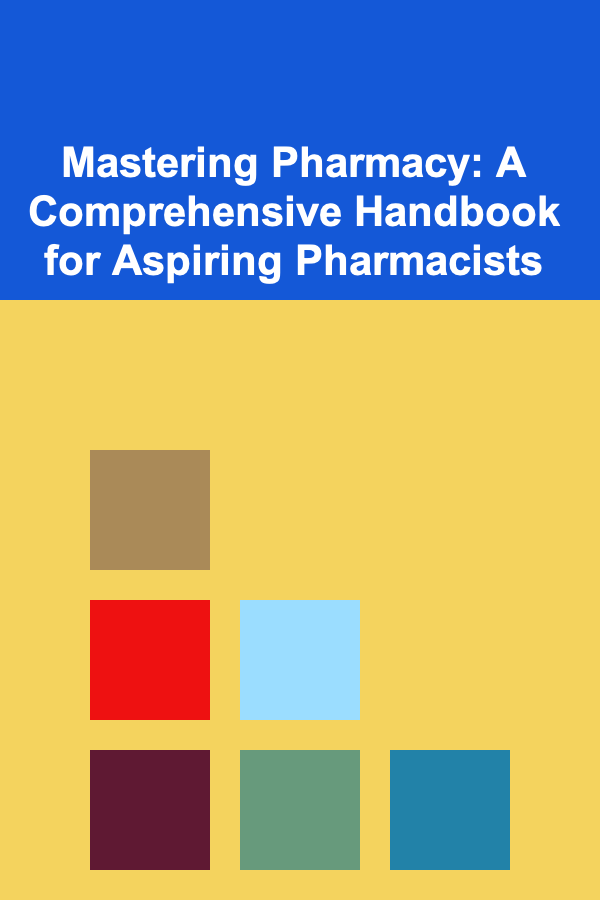
Mastering Pharmacy: A Comprehensive Handbook for Aspiring Pharmacists
ebook include PDF & Audio bundle (Micro Guide)
$12.99$5.99
Limited Time Offer! Order within the next:

Pharmacy is a vital pillar of modern healthcare, where pharmacists play an essential role in ensuring the safe and effective use of medications. For aspiring pharmacists, the journey to mastering the field requires not only understanding the science behind pharmacology but also the skills and strategies needed to navigate the complexities of patient care, clinical environments, and the business side of pharmacy. This comprehensive guide will provide an in-depth look into the key areas of pharmacy practice and offer actionable steps to succeed in this rewarding profession.
Understanding the Foundations of Pharmacy
Before diving into the nuances of pharmacy practice, aspiring pharmacists must first understand the foundational aspects of the field. This includes the study of pharmacology, the biochemistry of medications, and the anatomy and physiology of the human body.
a. Pharmacology and Drug Mechanisms
Pharmacology is the study of how drugs interact with biological systems. Understanding the mechanisms of action of different drug classes, including their therapeutic effects, side effects, and potential toxicity, is crucial for any pharmacist. Mastery of pharmacology allows pharmacists to make informed decisions about drug therapies, providing optimal care to patients.
Actionable Steps:
- Study drug classes and their mechanisms of action in detail, focusing on how they affect the body at the molecular level.
- Stay updated on the latest pharmacological research and emerging drug therapies.
- Understand the pharmacokinetics (how drugs move through the body) and pharmacodynamics (how drugs affect the body) of common medications.
b. Therapeutic Drug Management
Therapeutic drug management (TDM) involves optimizing drug therapy to achieve the best possible patient outcomes. This includes monitoring drug levels, adjusting dosages based on clinical parameters, and understanding drug interactions.
Actionable Steps:
- Learn how to perform therapeutic drug monitoring, especially for drugs with a narrow therapeutic index.
- Study the effects of drug-drug interactions, food-drug interactions, and the impact of comorbidities on drug efficacy.
- Get familiar with guidelines for managing common conditions such as hypertension, diabetes, and asthma.
c. Patient-Centered Care
Pharmacy is not just about dispensing medications; it's about understanding the needs of the patient and delivering personalized care. Patient-centered care involves assessing the individual's medical history, current medications, and lifestyle to ensure that the prescribed therapy is safe and effective.
Actionable Steps:
- Develop strong communication skills to effectively counsel patients about their medications, side effects, and treatment goals.
- Build rapport with patients to understand their preferences, concerns, and lifestyle factors that may influence their treatment.
- Learn to customize therapeutic regimens based on patient characteristics such as age, weight, renal function, and pregnancy status.
Developing Practical Pharmacy Skills
Theoretical knowledge forms the foundation of pharmacy practice, but practical skills are equally crucial. Aspiring pharmacists need to hone their abilities to navigate real-world clinical settings, manage patient care, and work within interdisciplinary teams.
a. Compounding Medications
Compounding is the process of preparing personalized medications for patients. Although much of the preparation of medications has been standardized, there are still instances where a compounded medication is necessary---whether for a pediatric patient requiring a liquid formulation or for a patient allergic to certain ingredients.
Actionable Steps:
- Learn the techniques of compounding, including accurate measurement, mixing, and sterilization.
- Understand the legal and regulatory requirements for compounding, such as those set by the United States Pharmacopeia (USP).
- Practice preparing a variety of compounded medications, including creams, ointments, capsules, and injectable solutions.
b. Medication Therapy Management (MTM)
MTM is an essential service that pharmacists provide to improve patient outcomes by optimizing medication use. This involves reviewing a patient's entire medication regimen, identifying potential issues (such as drug interactions or duplicate therapies), and making recommendations for adjustments.
Actionable Steps:
- Get familiar with the MTM process, including conducting comprehensive medication reviews (CMRs) and creating individualized care plans.
- Develop skills in identifying drug-related problems (DRPs), such as inappropriate drug choices, dosing errors, or lack of adherence.
- Learn to work with other healthcare providers to resolve issues and optimize medication regimens.
c. Clinical Decision-Making
Pharmacists often collaborate with physicians, nurses, and other healthcare providers in clinical settings. Effective clinical decision-making involves synthesizing knowledge from various sources to provide the best possible care to the patient.
Actionable Steps:
- Develop critical thinking skills by practicing case-based learning and participating in clinical rotations or internships.
- Stay informed on evidence-based guidelines and treatment protocols for common medical conditions.
- Learn how to assess a patient's condition, weigh the pros and cons of treatment options, and make evidence-based recommendations.
Navigating the Business Side of Pharmacy
In addition to clinical expertise, aspiring pharmacists must also understand the business aspects of pharmacy practice. Whether working in a retail pharmacy, hospital, or healthcare system, an understanding of the financial, operational, and regulatory components of the business is vital.
a. Pharmacy Management
Pharmacy managers oversee the daily operations of a pharmacy, which includes managing staff, ensuring regulatory compliance, and optimizing workflow to improve patient care. Effective management requires both leadership and organizational skills.
Actionable Steps:
- Develop leadership skills by taking on team management roles during internships or work placements.
- Learn how to manage pharmacy inventory, ensuring that medications are stocked appropriately and expire-free.
- Understand the regulatory environment, including the requirements of the Food and Drug Administration (FDA), Drug Enforcement Administration (DEA), and local pharmacy boards.
b. Financial Acumen
Pharmacy practice, especially in retail and outpatient settings, is heavily influenced by financial considerations. Aspiring pharmacists need to understand cost-effective medication dispensing, insurance reimbursement, and managing patient prescription costs.
Actionable Steps:
- Learn the basics of insurance billing, including understanding formularies, copayments, and prior authorization processes.
- Study strategies to manage medication costs and work with patients to find affordable alternatives.
- Get familiar with pharmacy revenue models, including prescription volume, over-the-counter sales, and other services provided by the pharmacy.
c. Legal and Ethical Issues
Pharmacists must adhere to ethical principles and legal regulations governing the practice of pharmacy. This includes ensuring the safe dispensing of medications, maintaining patient confidentiality, and practicing within the scope of the law.
Actionable Steps:
- Study pharmacy law, including the regulations set forth by the Drug Enforcement Administration (DEA) and the Board of Pharmacy.
- Develop an understanding of ethical issues such as patient confidentiality (HIPAA) and professional boundaries.
- Learn about the legal implications of medication errors, over-prescribing, and patient harm.
Continuing Education and Professional Development
Pharmacy is a constantly evolving field, and staying current with new medications, treatment protocols, and technology is essential for any pharmacist. Continuing education (CE) and professional development are critical for maintaining expertise and advancing within the field.
a. Certifications and Specializations
Obtaining additional certifications and specializing in certain areas of pharmacy practice can enhance career prospects. Specialties like oncology pharmacy, pediatric pharmacy, or pharmacotherapy are in high demand and offer opportunities for growth.
Actionable Steps:
- Consider pursuing board certifications in specialized areas of pharmacy practice, such as Board-Certified Pharmacotherapy Specialist (BCPS) or Board-Certified Oncology Pharmacist (BCOP).
- Stay current with professional journals and attend conferences to network and learn about emerging trends in the field.
- Seek mentorship from experienced pharmacists to guide your professional growth.
b. Networking and Professional Organizations
Joining professional organizations such as the American Pharmacists Association (APhA) or the American Society of Health-System Pharmacists (ASHP) provides opportunities for networking, continuing education, and staying updated on industry developments.
Actionable Steps:
- Become a member of national and local pharmacy organizations to stay informed on advocacy issues, regulatory changes, and professional standards.
- Attend conferences, workshops, and webinars to connect with other pharmacists and healthcare professionals.
- Volunteer or engage in leadership roles within professional organizations to develop your skills and expand your network.
Conclusion
Mastering the field of pharmacy is a lifelong journey that requires continuous learning, hands-on experience, and a commitment to patient-centered care. Aspiring pharmacists must be prepared to navigate a complex landscape, balancing clinical knowledge with practical skills, while also understanding the business and regulatory environments that influence their practice. By following this comprehensive guide, you will be well on your way to becoming a highly skilled and effective pharmacist, making a meaningful difference in the lives of your patients and advancing the field of healthcare.

How to Find the Right Contractor for Your Home Renovation
Read More
How to Handle Disputes with Tenants Professionally
Read More
How to Make Money Online as a Radiographer: 10 Actionable Ideas
Read More
How to Minimize Digital Clutter on Your Computer
Read More
How to Store Toys in a Way That Sparks Creativity
Read More
Making the Switch: Tips for Successfully Using Cash Instead of Credit Cards
Read MoreOther Products

How to Find the Right Contractor for Your Home Renovation
Read More
How to Handle Disputes with Tenants Professionally
Read More
How to Make Money Online as a Radiographer: 10 Actionable Ideas
Read More
How to Minimize Digital Clutter on Your Computer
Read More
How to Store Toys in a Way That Sparks Creativity
Read More